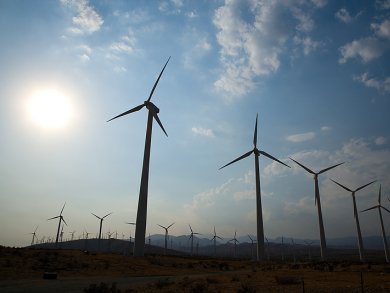Cutting Through the Renewable Energy Hype
Corporate strategist William Banholzer of The Dow Chemical Company in Midland, Michigan, USA, believes it is time to cut through the clean and renewable energy hype. He suggests that too many members of the general public do not have a clear understanding of energy issues and are being duped into accepting plausible-sounding but ultimately impractical solutions to mitigating energy and environmental concerns regarding fuel supply and climate change.
Writing in the journal Energy & Environmental Science, Banholzer suggests that many technologies and solutions are put forward, each with its pros and cons and each with its own potential for success or failure. “As scientists and engineers we must do a better job explaining the difference”, he says. It is science and engineering that provide the novel solutions, but can also validate their true potential and help society, policymakers and the electorate decide which alternatives we should be opting for, to build sustainability and energy security as best we can.
Banholzer is CTO at Dow and so has responsibility for pushing innovation forward, so-called value creation and in leading the company’s global R&D activities, he has purview of an annual budget of about $1.6 billion. As such, he is perhaps rather well placed to comment on the practicalities or otherwise of renewable and clean energy supplies. Banholzer relates an anecdote concerning a colleague whose understanding of solar power was sorely lacking. Apparently, the colleague was hoping to buy a solar-powered car and simply did not understand that a practical road vehicle simply could not be powered by incident sunlight alone, despite the obvious attraction such a car would have in terms of free fuel. He suggests that such a lack of understanding among educated people from non-technical fields, and even those originally from a technical background, is commonplace today.
Asking the Right Questions
The problem with such a state of affairs is that the non-tech savvy are complicit in the hyperbole surrounding renewable and clean energy. They assume the experts promoting and marketing alternatives are honest and have undertaken due diligence in terms of the cradle-to-grave assessment and energy balance of their products. After all, given the option of free electricity for life via roof-based, government-subsidized photovoltaic solar panels, how many people actually ask any serious questions about such a system. Questions such as how long do the panels remain active and optimally efficient? What are the initial energy costs of manufacturing and ultimately of recycling or disposing of such devices at the end of their serviceable life? Economically, the free electricity might benefit us on a per building basis, but overall what is the carbon footprint of all that highly processed silicon?
Similarly, questions are rarely asked of the benefits of wind and tidal power, or biomass production, of fuel crops and other allegedly “green” alternatives to fossil fuels. Of course, our reliance on fossil fuels must be addressed, both in terms of stifled supplies and the impact they have on international politics and the war machine, as well as in terms of carbon emissions and climate change. But, it is only science and engineering that can truly balance the energy books.
- Practical limitations and recognizing hype,
William F. Banholzer,
Energy Environ. Sci. 2012.
DOI: 10.1039/c2ee03146a



